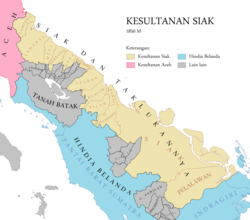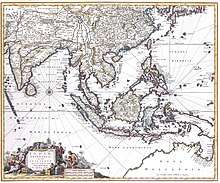Sultanate of Siak Sri Indrapura Kesultanan Siak Sri Inderapura كسلطانن سياك سري اندراڤور | |||||||||
|---|---|---|---|---|---|---|---|---|---|
| 1722–1949 | |||||||||
 Siak and its dependencies, 1850. | |||||||||
| Capital | Buantan, Mempura, Senapelan Pekanbaru, Siak Sri Indrapura | ||||||||
| Common languages | Malay | ||||||||
| Religion | Sunni Islam | ||||||||
| Sultan Yang Dipertuan Besar | |||||||||
• 1722–1746 | Abdul Jalil Rahmad Syah I | ||||||||
• 1915–1949 | Syarif Kasim II | ||||||||
| History | |||||||||
• Founded | 1722 | ||||||||
• Joined Republic of Indonesia | 1949 | ||||||||
| |||||||||
| Today part of | Indonesia | ||||||||
| History of Indonesia |
|---|
 |
| Timeline |
|
|
The Sultanate of Siak Sri Indrapura, often called Sultanate of Siak (Indonesian: Kesultanan Siak Sri Inderapura; Jawi: كسلطانن سياك سري اندراڤور), was a kingdom that was located in present-day Siak Regency, and nearby other regions from 1722 to 1949. It was founded by Raja Kecil, who had close relations with the Johor Sultanate, after he failed to seize the Johor throne. The polity expanded in the 18th century to encompass much of eastern Sumatra as it brought various communities under its control through warfare and control of trade between the interior of Sumatra and the Malacca Strait.[1] The Dutch colonial state signed a series of treaties with the Siak rulers in the 19th century, which reduced the area of state influence to the Siak River. For the remainder of the Dutch colonial era, it operated as an independent state with Dutch advisors. After Indonesia's Independence was proclaimed on 17 August 1945, the last sultan of Siak, Sultan Syarif Kasim II, declared his kingdom to join the Republic of Indonesia.
- ^ Barnard, TP (2003). Multiple centres of authority: society and environment in Siak and eastern Sumatra, 1674-1827. KITLV Press. ISBN 90-6718-219-2. OCLC 474230127.

